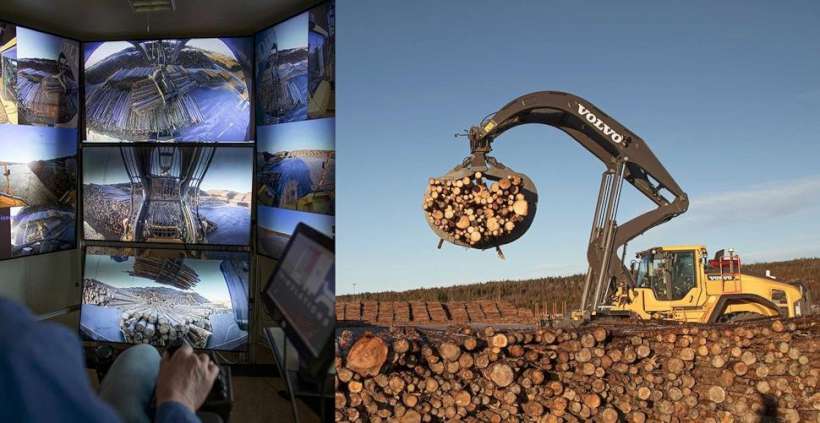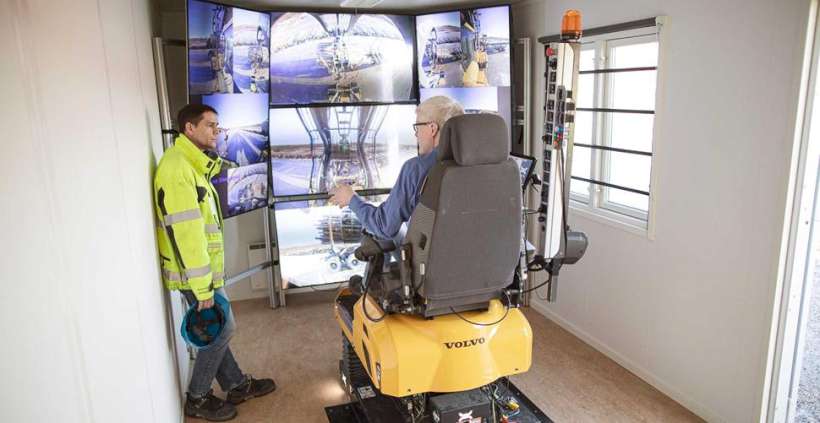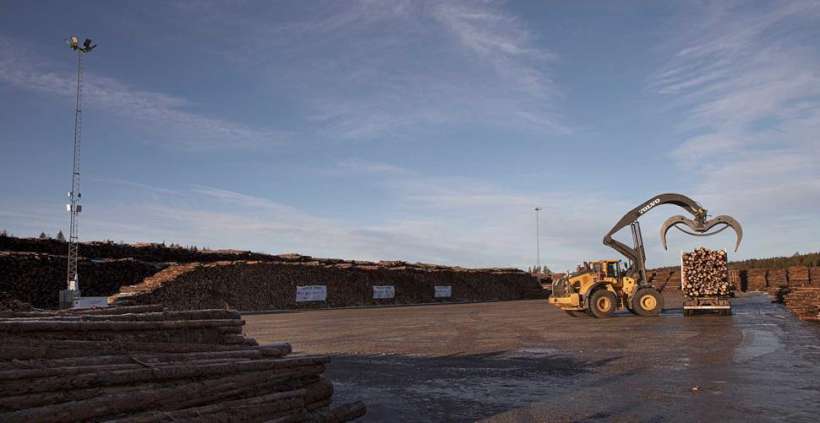There are plenty of remote jobs that need doing that many machinery operators would prefer not to. Being able to operate their machinery from the comfort of an office whilst the machines are miles away in the freezing cold would be a massive bonus to many operators.
So, Volvo Construction Equipment’s world first trial of a remote-controlled High-lift wheel loader over a 5G network in a complex forestry application shows us the way the future of plant operation could be headed.

Only a Research Project
The unique research project Remote Timber is a collaboration between Volvo CE and the telecom operator Telia, timber and paper manufacturer SCA, Mid University Sweden, Skogforsk and Biometria. This week’s tests at SCA’s timber terminal in Torsboda, Sweden, have demonstrated that it is possible to tele-operate a Volvo L180 High-lift wheel loader, hundreds of kilometers away. And by using a closed 5G network, low latency has proven to be a major advantage – allowing operators to perform the sensitive process of picking, loading and organizing logs remotely.
Tele-operated forestry is expected to deliver improved productivity by allowing one operator to work across multiple – and sometimes isolated – sites around the world. It is also expected to make it both safer, by removing humans from potentially hazardous environments, and more sustainable, through more efficient logistics flows as the loading and unloading of timber can also be done during the night.
The Definition of ‘Working from Home’
Christian Spjutare, Advanced Engineering Program Manager at Volvo CE, says: “We expect tele-operation to open up far greater opportunities for operators than is currently available. Sometimes it can be difficult to hire people in timber terminals because of their remote locations. But tele-operation allows people to work from any location, no matter the distance, making it a more desirable work setting, with the added advantage of more efficient and sustainable work logistics.”

Magnus Leonhardt, Director, Head of Business Development & Innovation at Telia adds: “This partnership is a fine example of how remote control with the latest technology can contribute to more efficient and sustainable construction solutions in the forestry industry. A secure and robust digital infrastructure is crucial for this. The unique technical qualities that 5G offers are also entirely critical, in which extremely quick response times and high capacity enable immediate feedback between operator and machine, which is a prerequisite for being able to safely control machines remotely.”
Remote precision in its grasp
An important aim of this research project is to explore exactly what is required from an operator perspective in making tele-operation a user-friendly and efficient experience. Because each load of timber can be so varied – from an unwieldly pile of heavy logs through to just a few short pieces of wood – it is vital that the lifting process is carried out with pinpoint accuracy and incredibly precise handling.
As a result, there are currently a number of connected cameras and sensors located at strategic points around the machine that transmit real-time data via the Telia 5G network back to the control station. The test will therefor both explore how to mature the technology and gather vital feedback from the operators on the optimum placement of those cameras for handling precision.

Volvo CE has for the past few years been exploring the potential for tele-operation across a variety of segments from mining to urban construction, with this project testing the technology in its most challenging application yet. By remote-controlling processes like timber lifting – which are currently too complex to be fully automated – tele-operation becomes an important enabler for automation, allowing for a more gradual integration of automated processes for customers.
“This research project gives us an opportunity to test our teleoperation platform in a new application with high precision requirements and learn how the system needs to be designed to meet industry needs. Insights from partial manual and tele-operated management enables us to also take steps towards automation in more complex processes”, Christian concludes.